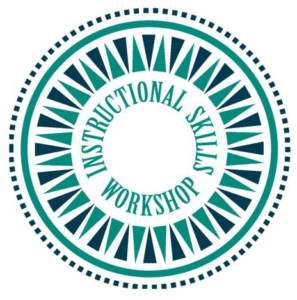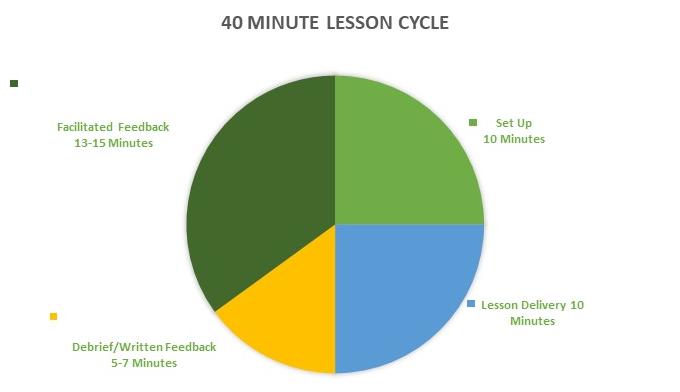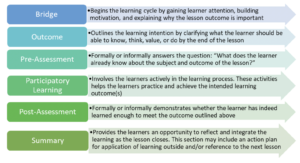
Author: Mandy Frake-Mistak
Overview of the Instructional Skills Workshop (ISW)?

The Instructional Skills Workshop (ISW) is a Canadian, grassroots, peer-based certificate program. Organized around a specific three- or four-day structure (24 hours in total), this highly intensive workshop encourages participants to reflect on their approaches to teaching, philosophy of teaching and learning, and lesson design process. Participants work collaboratively and actively in a small group setting (e.g. 1 Facilitator:5 Participants) to further develop their teaching effectiveness through the design and delivery of three 10-minute lessons. Following each lesson, participants receive reflective oral, written, and video feedback from their peers who will have been learners in the lesson. New teaching strategies, techniques, and ideas are curated and shared as a part of this process. This workshop uses an intensive experiential learning approach through which participants are provided with information on the theory and practice of teaching adult learners, the selection and writing of useful learning outcomes with accompanying lesson plans, techniques for eliciting learner participation, and suggestions for assessment.
The workshop encourages reflection and examination of one’s teaching practices with feedback focused on the learning process rather than on the specific content of the lesson. The ISW engenders participatory learning and the building of community that can transfer back into the classroom and the institution. Because this is a peer-based workshop, participants’ success (and the success of others in the group) is entirely dependent upon complete commitment to the process. It is imperative that participants commit to the full 24 hours in their entirety.
The underlying principles of the workshop include participatory learning, diversity of learning, adult learning, and building of learning communities in classrooms and institutions. Participants receive a handbook of resources to assist them in the planning of their 10-minute lessons and as a reference guide post-workshop. They also receive a certificate of completion recognized by many Canadian and international institutions. Participants benefit from joining a network of colleagues who are committed to and invested in continuous improvement of teaching and learning. Upon completion of the workshop those who are interested may wish to become facilitators of the Instructional Skills Workshop by taking the 5-day Facilitator Development Workshop (FDW) and becoming part of a team responsible for delivering and supporting the ISW and related activities at their institution or organization.
Watch these videos for additional background on the ISW:
The Instructional Skills Workshop – A Conversation with Douglas Kerr
YorkU Teaching Commons: Instructional Skills Workshop
A Brief History of the ISW
The ISW was created in British Columbia, Canada in 1979 in response to an expansion of the college sector and an increasing need for professional development programming for both new and experienced instructors. Diane Morrison of the then British Columbia Ministry of Education, commissioned Doug Kerr, then of Vancouver Community College to develop a program that would be highly effective but not an onerous time commitment. With rapid success of the ISW, the certificate program made its way into the universities where it had the same levels of success. The ISW has since grown and expanded across Canada as well as into the United States and many other countries across the globe. Since then, many have served as ISW Facilitators and Trainers in colleges, institutes, universities, polytechnics, hospitals, government departments, non-profits, and training organizations around the world.
How Does it Work?
The ISW is designed to enhance instructors' skills through intensive and practical exercises in learning-centred teaching. Through small and large group interaction, participants engage in:
- planning and delivering 10-minute lessons
- developing participatory instructional techniques
- listening actively
- learning and teaching collaboratively
- modelling adult learning principles
- generating effective feedback and discussion
Prior to the start of the workshop, participants receive the ISW handbook and all accompanying resources including “Six Elements of a Lesson,”which is a lesson planning model, also known as BOPPPS, that is helpful as a starting point for discussions on instructional design and delivery (see BOPPPS model and references below).
During the 24-hour workshop period, (typically offered over three or four days, although there are online adaptations to be found), each participant delivers three 10-minute lessons to a small group of 4-6 people, and receives oral, written and video feedback on each lesson. Each lesson is recorded so that instructors may reflect on their lessons and feedback.
Creating a safe space for learning and growth is essential in this workshop. Facilitators spend a great deal of time on the first day establishing a positive and confidential learning environment for all present. To do so involves using icebreakers, team building strategies, open discussion and collaborative listing of what will make the learners at ease with sharing vulnerabilities and skills that are being refined.
Participants may teach any topic they wish in their lessons, but are strongly encouraged to teach something outside of their discipline – content is not the focus, but rather the instructional design process that forms the crux for both individual reflection and group feedback. All participants present one lesson per day. Each 10-minute lesson is part of a larger 40-minute teaching cycle focusing on one participant at a time. Each of these teaching cycles consists of the following 4 elements:

Each workshop participant presents a total of three 10-minute lessons, one lesson per day. Participants are encouraged to reflect on their own learning and that of others, and to incorporate new understandings into the next day’s lessons.
In addition to the lesson cycles, workshop facilitators lead longer sessions of 45-minutes to an hour, on teaching-related topics such as learning outcomes, active learning, feedback and assessment, making lesson and course design accessible. Facilitators also explore other topics identified by the participants.
The end of the workshop focuses on the bigger picture of how BOPPPS can be used across a course and in more conventional teaching environments. The workshop usually ends with celebratory activities to recognize the strengths and contributions of each of the participants. It is important to acknowledge that the ISW is a developmental model, and that the facilitators work hard to ensure that everyone can reflect on their individual strengths, opportunities for growth, and how their skills can best be incorporated into the classroom or training context. Participants are also encouraged to explore further professional development opportunities after the Instructional Skills Workshop concludes, as continued development is an essential feature of the ISW.
Six Elements of a Lesson (BOPPPS)
Although many lesson planning models exist, foundational to the ISW are six core elements, also known as “BOPPPS”. The six elements listed below, are significant to the learning process regardless of the content and the setting. During the workshop participants are asked to design each of their 10-minute lessons using BOPPPS. How time is allocated for each of the elements is up to the instructor and should be determined by the learning outcomes defined for the lesson. These six elements of a lesson also provide a structure for analysis on which both written and oral feedback will be based.

To learn more about lesson planning using BOPPPS, watch these videos:
How to Plan a Lesson Using BOPPPS
Lesson Design Using the “BOPPPS” Model
Resources
-
- Exec & Advisory: https://www.iswnetwork.ca/contact/isw-network-executive-team-advisory-committee/
- Local Reps: https://www.iswnetwork.ca/contact/local-representatives/
- If looking specifically for roles and responsibilities of local reps: https://iswnetwork.ca/wp-content/uploads/2020/06/roles-and-responsibilities-of-local-representatives_2020-1.pdf
ISW Related References
Bubak, O. (2019). A bottom-up drive to transform tertiary teaching. How McMaster University’s faculty of engineering is motivating new professors to improve their teaching effectiveness.
Day, R. & the ISW International Advisory Committee. (2005). Instructional Skills Workshop: The Heart of an Educator Learning Community in British Columbia and Beyond
Dawson, D., Borin, P., Meadows, K., Britnell, J., Olsen, K. & McIntryre, G. (2014). The Impact of the Instructional Skills Workshop on Faculty Approaches to Teaching. Toronto ON: Higher Education Quality Council of Ontario
Foxe, J.P., Frake-Mistak, M., & Popovic, C. (2017) The instructional skills workshop: A missed opportunity in the UK?, Innovations in Education and Teaching International, 54:2, 135-142, DOI: 10.1080/14703297.2016.1257949
Kerr, D.W. (1980). The Instructional Skills Program. Unpublished Ministry of Education major paper. Vancouver: University of British Columbia.
Macpherson, Alice. 2011. The Instructional Skills Workshop as a Transformative Learning Process. Ph.D. Dissertation. Simon Frasier University.
Morrison, D.E. (1985). “The Instructional Skills Workshop: An inter-institutional approach.” In To Improve the Academy, 4, 75-83.
Morrison, D.E. (1995). “Opening doors to better teaching: The role of peer-based instructional consultation.” (Doctoral dissertation, The Claremont Graduate University). Dissertation Abstracts International, 56(6), 2134A.
Morrison, D.E. (1997). “Overview of instructional consultation in North America.” In K. Brinko & R. Menges (Eds.), Practically Speaking: A Sourcebook for Instructional Consultants in Higher Education, 121-129. Stillwater, OK: New Forums Press.
Wilbee, J. (1997). “The Instructional Skills Program: A peer-based model of the improvement of teaching and learning.”
*************************************************************************************************

This work is licensed under a Creative Commons Attribution 4.0 International License.

